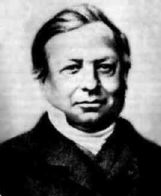

Joseph Liouville went to the Collège St. Louis in Paris where he studied mathematics at the highest levels. He entered the Ecole Polytechnique in 1825, and attended courses by Ampère and Arago. Although Liouville does not seen to have attended any of Cauchy's courses, it is clear that Cauchy must have had a strong influence on him. Liouville graduated in 1827, with de Prony and Poisson among his examiners.
After graduating, Liouville was set on an academic career. Already he had written and submitted a number of papers to the Academy on electrodynamics, partial differential equations and the theory of heat. In 1831, Liouville was appointed to a number of private schools and to the Ecole Centrale. It is remarkable that during this period of his life Liouville
taught between 35 and 40 hours a week at the different institutions. Perhaps with a schedule this heavy, it is not surprising that some courses would not go as well as he would have wanted, and it appears that he lectured at too high a level for some of the less able students.
In 1836, Liouville founded a mathematics journal Journal de Mathématiques Pures et Appliquées. This journal did much for mathematics in France throughout the nineteenth century. In 1838, Liouville was appointed Professor of Analysis and Mechanics at the Ecole Polytechnique. The following year he was elected to the astronomy section of the Académie des Sciences. In 1840, after a vacancy resulting from the death of Poisson, Liouville was elected to the Bureau des Longitudes. Liouville had already gained an international reputation. During the summers, he undertook research, wrote papers and
carried out editing duties. During the winters, he carried out his teaching and administrative duties.
Before 1840, Liouville had pursued some clear paths to secure his own career. During the following twenty years, the promotion and development of other mathematicians' ideas became the central issue.
Another aspect of Liouville's life was his involvement in politics. In 1848, he was elected to the Constituting Assembly, but he was not reelected the following year. The political defeat changed Liouville's personality. He became bitter, even towards his old friends. His mathematical notes were often interrupted with quotes from poets and philosophers.
Although Liouville's mathematical output had been greatly reduced while he was involved with politics, it picked up again in the 1850's despite health problems. In fact 1856 and 1857 were two of Liouville's most productive years. Eventually, his teaching load began to take its toll on him. He continued to publish, but mostly these were results he had discovered during his highly productive year of 1856, and these were published without the proofs which now he could not find time to polish.
Liouville's mathematical work was extremely wide ranging, from mathematical physics to astronomy to pure mathematics. One of the first topics he studied, which developed from his early work on electromagnetism, was a new topic, now called the fractional calculus. He defined differential operators of arbitrary order. Liouville investigated criteria for integrals of algebraic functions to be algebraic. Having established this in 4 papers, he went on to investigate the general problem of integration of algebraic functions in finite terms. His work at first was independent of that of Abel, but later he learnt of Abel's work and included several ideas into his own work.
Another important area which Liouville is remembered for today is that of transcendental numbers. He constructed an infinite class of transcendental numbers using continued fractions. In 1851, he published results on transcendental numbers removing the dependence on continued fractions. In particular he gave an example of a transcendental number, the number now named the Liouville number 0.1100010000000000000000010000..., where there is a 1 in place n! and 0 elsewhere.
His work on boundary value problems on differential equations is remembered because of what is called today Sturm-Liouville theory, which is used in solving integral equations. This theory, which has major importance in mathematical physics, was developed between 1829 and 1837. Sturm and Liouville examined general linear second order differential equations and examined properties of their eigenvalues, the behaviour of the eigenfunctions and the series expansion of arbitrary functions in terms of these eigenfunctions.
Liouville contributed to differential geometry studying conformal transformations. He proved a major theorem concerning the measure preserving property of Hamiltonian dynamics. The result is of fundamental importance in statistical mechanics and measure theory.
Liouville was also a major influence in bringing Galois's work to general notice when he published Galois's notes in 1846. In number theory, Liouville wrote around 200 papers, working on quadratic reciprocity and many other topics. He wrote over 400 papers in total.